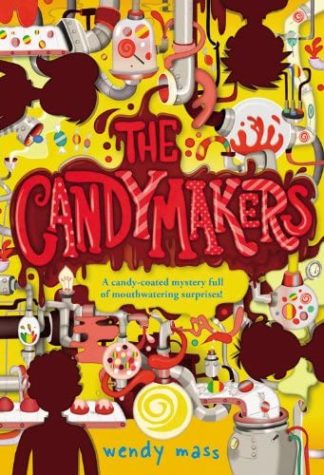Books that will get you into the fall spirit
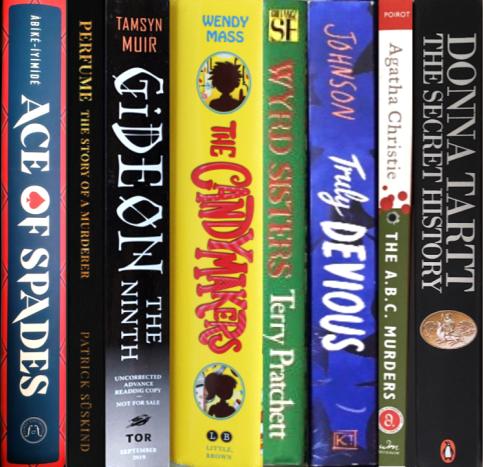
Did you know that fall is the favorite season of most Americans? This probably isn’t all that surprising. Spring and summer can be a bit monotonous, and winter is just so, so cold.
What makes fall so fun, though, is just how many distinct fall things there are. Red leaves, scary movies, sweets— these are all undeniably fall things, even though they don’t seem alike at all.
Of course, this variety also means that it is the perfect season for any recommendation-based article because there’s a bit of something for everyone. In this article, I have included thrillers, silly and nostalgic books, mysteries, and dark academia. Without further ado, I’d like to introduce eight book reviews for autumn!
Thrillers
Fall can be associated with many different ideas and feelings, but for me, it is and has always been Halloween and horror. I’ve never been a big fan of scary movies, but I’ve found that books are a great way for me to join in on the fun. “Thriller” is an amazingly diverse genre, but whether the story is about innocent victims, disgusting villains, or even space, thrillers are hard to not like.
Ace of Spades by Faridah Àbíké-Íyímídé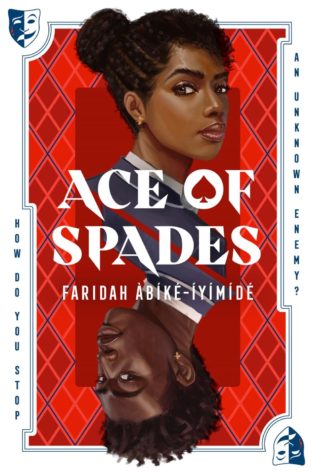
Publisher’s description:
“An incendiary and utterly compelling thriller with a shocking twist that delves deep into the heart of institutionalized racism, from an exceptional new YA voice.
Welcome to Niveus Private Academy, where money paves the hallways, and the students are never less than perfect. Until now. Because an anonymous texter, Aces, is bringing two students’ dark secrets to light.
Talented musician Devon buries himself in rehearsals, but he can’t escape the spotlight when his private photos go public. Head girl Chiamaka isn’t afraid to get what she wants, but soon everyone will know the price she has paid for power.
Someone is out to get them both. Someone who holds all the aces. And they’re planning much more than a high-school game…”
To say that it had me looking over my shoulder would be an exaggeration, but what is not an exaggeration is that this book left me with adrenaline rushing through my body, tightness in my muscles, and sleep deprivation from staying up late to finish it. Ace of Spades fully grabbed my attention from the very beginning, and it takes full advantage of the greatest strength of thrillers as a genre – the ability to create tension.
While the premise of their torments is simple, the book does a great job of setting the stakes for each character. What Devon and Chiamaka experience goes beyond simple humiliation. It is the sickening violation of their privacy and the terror of knowing that it will happen again and again and again. It’s hard not to feel sympathy for any character whose life is falling apart right in front of them, and Devon and Chiamaka are no exception.
However, the characters are elevated beyond many other thriller protagonists because the reader is not only driven to feel sympathy for their pain, but also to understand their desires and personalities, making them characters in their own right rather than just vessels for terror. Chiamaka does feel a little like a caricature of popular private high school girls, and I can’t help being a little critical of any media that portrays teenagers as fighting a cut-throat, kill-or-be-killed battle of high school popularity, but she did grow on me.
That being said, the book focuses almost entirely on building up the story but is lacking in terms of resolution. Many of the reveals are cartoonish and rely on the shock factor without lingering enough on the actual consequences of such reveals. Furthermore, the final reveal and resolution – while intriguing – is rushed, not well thought out or explained, and demonstrates more faith in social media activism than I am willing to share.
It’s not the most satisfying conclusion, but at the same time that doesn’t change the fact that I was hooked throughout most of the book and did enjoy reading it. As one might expect from a book like this, it is not a light story, and (as with all books) you should search up content warnings for this book before reading but I would still recommend it to anyone who is looking to read more thrillers, especially for anyone looking to make the transition from YA to thrillers.
Perfume: The Story of a Murderer by Patrick Süskind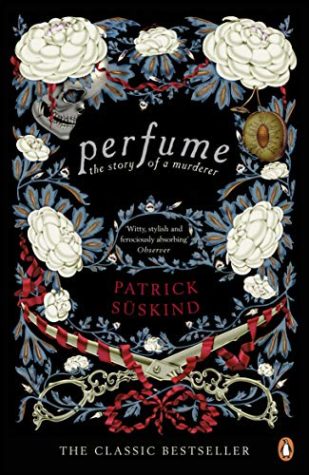
Publisher’s description:
“An acclaimed bestseller and international sensation, Patrick Suskind’s classic novel provokes a terrifying examination of what happens when one man’s indulgence in his greatest passion – his sense of smell – leads to murder.
In the slums of eighteenth-century France, the infant Jean-Baptiste Grenouille is born with one sublime gift – an absolute sense of smell. As a boy, he lives to decipher the odors of Paris, and apprentices himself to a prominent perfumer who teaches him the ancient art of mixing precious oils and herbs. But Grenouille’s genius is such that he is not satisfied to stop there, and he becomes obsessed with capturing the smells of objects such as brass doorknobs and fresh-cut wood. Then one day he catches a hint of a scent that will drive him on an ever-more-terrifying quest to create the “ultimate perfume” – the scent of a beautiful young virgin. Told with dazzling narrative brilliance, Perfume is a hauntingly powerful tale of murder and sensual depravity.”
How rational are humans? Sure, we’re smart and we’ve left the marks on this world to prove it, but what if, deep down, we are all just driven by something as base and instinctual as scent, like dogs sniffing pheromones? Perfume: the Story of a Murderer by Patrick Süskind takes this idea to the extreme, envisioning a world that is ours, but is made foreign through the prominence of something we so often ignore.
Now let’s address the elephant in the room – do we really need another book about some creepy man who kills young girls? Not really. I just don’t think that men killing women over possessiveness and lust is at all interesting. Many of these books seem to think that it alone delves into the dark, unfathomable depths of the human mind, and the prevalence of this is honestly a bit concerning. So, it might be a bit surprising that I found the same premise interesting in this book.
What sets this story apart from many similar thrillers is that this takes an actually unique stance on the killer’s motivation. Grenouille is not misunderstood, but parasitic, and, unlike in many overdone incel manifestos, Grenouille kills not because he wants to possess the person, but because he wants to possess the effect they have. The command his victims hold over him is what he wants to hold over others, and to do so, he resolves to kill them.
However, as you might expect from his pool of victims, this book still does fall into the unfortunately common trope of assigning inherent desirability to very young girls and their status as virgins, and I don’t think I really need to explain why this is uncomfortable.
Grenouille is far from an unproblematic fave, and the book does little to absolve him of blame. Honestly, if anybody is able to read this book without sometimes feeling a healthy amount of disgust at both the character for his actions and the author for writing this book, I would probably be concerned. Yet at the same time, Suskind injects a kind of reverence into the reader for the subtle yet powerful realm of scent.
Just as Grenouille is subject to “sensual depravity,” the reader is dragged down, too, into intoxication at the hands of the masterful narration. Truly, whatever all encompassing power this book assigns to scent might not be too different from the power of words, as this book manages to imbue a sense of decadence (and an unexpected humor) into even the grossest of settings that is equal parts captivating and disturbing.
True to the title, yet still surprising, is that the book is not the story of murder but the story of a murderer. Very little of the book is focused on the actual murders, which take place mostly off screen and near the end. Most is dedicated to Grenouille’s life and him cultivating the skills which he intends to use on his victims, and it closes out with a suitably chilling and dramatic fashion. Furthermore, the onscreen deaths are overwhelmingly not the direct effect of Grenouille’s actions, they simply happen. As soon as he leaves one character behind to continue his journey, they die as if he had inhaled them till there was simply none left. In Perfume, human life is as ephemeral as scent, but it is also much less important.
Perfume is not a book I can really recommend because I have a lot of conflicted thoughts on it, and it is definitely not a book to read if you want something to casually enjoy, but if nothing else, it sure is memorable.
Gideon the Ninth by Tamsyn Muir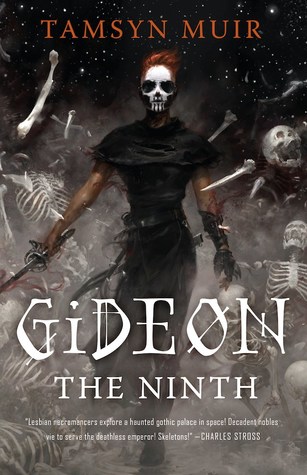
Publisher’s description:
“The Ninth Necromancer needs a swordswoman.
Gideon has a sword, some dirty magazines, and no more time for undead b——-.
Brought up by unfriendly, ossifying nuns, ancient retainers, and countless skeletons, Gideon is ready to abandon a life of servitude and an afterlife as a reanimated corpse. She packs up her sword, her shoes, and her magazines, and prepares to launch her daring escape. But her childhood nemesis won’t set her free without a service.
Harrowhark Nonagesimus, Reverend Daughter of the Ninth House and bone witch extraordinaire, has been summoned into action. The Emperor has invited the heirs to each of his loyal Houses to a deadly trial of wits and skill. If Harrowhark succeeds she will become an immortal, all-powerful servant of the Resurrection, but no necromancer can ascend without their cavalier. Without Gideon’s sword, Harrow will fail, and the Ninth House will die.
Of course, some things are better left dead.”
Packed with action, humor, and a theatrically macabre aesthetic, Gideon the Ninth is just plain fun to read. It is a book full of contradictions that manages to pull off putting modern memes into a gothic sci-fi setting, a gigantic cast of characters who are all as interesting (and frequently as deranged) as the book itself, and a premise unique enough that I feel I’m doing it a disservice by trying to categorize this book as just one thing.
There are lots of reasons a person might write a book, be it to explore characters or relationships or themes or some combination of these. The main purpose of Gideon the Ninth is, in my opinion, its worldbuilding. This world – its magic, its mysteries, its flair – is all so deeply integrated into the aesthetic and appeal of the book, and exploring this isn’t just the job of the authors and the readers, but also the characters. Even as someone who is often bored by elaborate worldbuilding, I was able to appreciate and enjoy this approach.
That being said, it isn’t the perfect book for everyone. It introduces a lot of information right off the bat, much of which isn’t well explained, so the already dense book becomes that much more difficult to trudge through. Additionally, Muir’s writing is deliberately confusing in order to obscure twists and avoid info-dumping, which I say not to challenge readers into trying to deconstruct and predict the book while reading it for the first time, but to encourage readers to become immersed in its confusion and even to enjoy it.
Once you get past the long, dense introduction, though, the characters begin to disappear one by one, it becomes clear that the protagonists are trapped with whatever is hunting them, creating a suspenseful and hard-to-put-down story. I personally love reading about characters who are just a little (or in this case, a lot) unhinged, and what better set up is there to get characters to interact in increasingly strange ways?
What really makes this book is a combination of absurdity and absolute seriousness. Muir seems to have an instinctive understanding of when to be irreverent and when to be very, very serious, and she switches between the two with admirable dexterity, creating a much more complete experience. This book made me laugh then cry. It’s fun and adventurous, but also heartbreaking when it needs to be, and even more so in the following book, Harrow the Ninth, which does a great job of filling in some of the gaps in Harrow’s character development which I felt weren’t adequately addressed in the first book.
While this review is about the first book, I think it is worth mentioning the second because it varies so greatly from the first. Gideon the Ninth leans more on the mystery/thriller side, and Harrow the Ninth leans more heavily on the hard sci-fi, character study, space opera/western sides (not even mentioning the drastic tone shift between the narrative voices of Gideon and Harrow), while still managing to keep the core of what made the first book so compelling and demonstrating Muir’s great versatility.
Gideon the Ninth is not without faults by a long shot. It’s messy and confusing a lot of the time, but it is the kind of book where you can tell – just by reading – how much fun the author had writing it, and that is hard to ignore.
Silly and nostalgic books
Scary things are great and all, but let’s be honest, Halloween is for kids. As such, it is as good an excuse as any to revel in the “funner” side of things. Simple and sugary, satirical and silly, everyone can have a good laugh.
Publisher’s description:
“Four children have been chosen to compete in a national competition to find the tastiest confection in the country. Who will invent a candy more delicious than the Oozing Crunchorama or the Neon Lightning Chew?
Logan, the Candymaker’s son, who can detect the color of chocolate by touch alone?
Miles, the boy who is allergic to merry-go-rounds and the color pink?
Daisy, the cheerful girl who can lift a fifty-pound lump of taffy like it’s a feather?
Or Philip, the suit-and-tie wearing boy who’s always scribbling in a secret notebook?
This sweet, charming, and cleverly crafted story, told from each contestant’s perspective, is filled with mystery, friendship, and juicy revelations.”
Brightly saturated, wacky, and full of the power of friendship, The Candymakers by Wendy Mass truly embodies the giddiness of a kid in a candy store (or, in this case, a candy factory). If you love colorful gadgets that don’t quite make sense, candy that does things that candy shouldn’t be able to do, and hijinks, this is the book for you.
I will freely admit that some of the intense delight and nostalgia that this book incites in me is because it is one of my childhood favorites, but even regardless, Mass does a fantastic job of capturing not only the lively and bright aesthetics of the media we all grew up on, but also the more true-to-life introspection and hesitance of childhood which Mass brings to all her books.
One of the main ways the author achieves this is by telling the exact same story from four different perspectives. Lots of the books that I’ve mentioned already do this, but they usually assign different characters different scenes, whereas in The Candymakers, the scenes are simply retold with the same events and dialogue, but completely different viewpoints and interpretations. This is a very risky gamble since it could so easily become boring, and yet it works because every character is so intensely different.
These differences create wildly different tones throughout the book and what I can only describe as genre-ception, which adds layers to the plot as well as the characters and their relationships as well. It’s very telling — the things each character hides about themselves, the difference between their intentions and their actions, their thoughts and their words. The contrast between each character’s internal and external worlds is what creates the sense of trying to navigate friendship for the first time and the difficulties that come with it, which is often overlooked in children’s stories.
Each character was complex while still being exaggerated in a playfully cartoonish way because they were given the chance to share their side, and I really enjoyed each character’s perspective. The one exception to this is Logan, not because he is a boring character, but he is just more interesting when viewed by the other characters than by himself, possibly because such a large part of his character is the effect he has on the others.
And while the child-like nature of this story is my favorite part of this book, it also shows through in some less flattering areas. The dialogue is often hard to read and unnatural, with humor that was probably more funny as a kid, but what I found most disappointing was the handling of each character’s development. Each character did grow and change, but it was sometimes glossed over and way too rushed. People don’t usually change their entire outlook on life with little to no consequences or introspection, but this story seemed to skip over much of this. This is understandable for a children’s book, but I still think that they could have been more satisfying if their development had been treated as part of the story rather than just a part of the happy ending.
Overall, this book’s greatest challenges as well as its greatest advantages is that it is aimed at children, but even so, revisiting it many years later, it’s mostly held up well, and is the perfect comfort book that should never, ever be read while hungry.
Wyrd Sisters by Terry Pratchett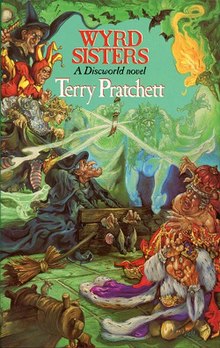
Publisher’s description:
“Kingdoms wobble, crowns topple and knives flash on the magical Discworld as the statutory three witches meddle in royal politics. The wyrd sisters battle against frightful odds to put the rightful king on the throne. At least, that’s what they think..”
If you saw our school’s production of “Something Rotten” last year and absolutely loved it, this may be the book for you. The best description I could give this is if Monty Python retold Shakespeare’s “Macbeth.” Packed with dry, unexpected humor, this book pokes fun at everything and anything to create a truly absurd and vivid story.
In this book, the humor is the center of the story, and that’s something that I think anyone would absolutely love. There is almost something that feels a bit nostalgic about the humor, as it draws on the kooky wizards and kings from children’s stories. Even the iconic, internet famous quote “the fool jingled miserably across the floor,” is from this book.
One problem is that the book gets a bit lost in the humor, and is sometimes lacking in other parts. This can be excused in a short performance or movie that’s consumed in one sitting, but its harder to ignore it in a full-length book. While I wouldn’t necessarily say I was bored at any point, the fact that the plot and characters take a backseat in this book means that when you put down the book, there’s not anything to pull you back into it, making it easy to forget to pick it up again.
Reading a book so dense in humor can be tough, because even when you read something you know is funny, it doesn’t necessarily feel quite as funny. For that reason, I think that this book might be best enjoyed as an audiobook, which can better capture the comedic timing and colorful characters. Overall, while I think that this book might be better suited to another form, it still has such a distinct style and completely commits to its goal of making the reader laugh.
Mystery
In a similar vein as thrillers, mysteries have a kind of classic Halloween appeal that is inseparable from autumn. The line between the two is a bit blurry, but there is also something a bit nostalgic about a good mystery. Maybe that’s just because I watched too many crime procedurals as a kid. Regardless, mysteries hold a special place in my heart, and if you like them, too, maybe take a look at the next two books.
Truly, Devious by Maureen Johnson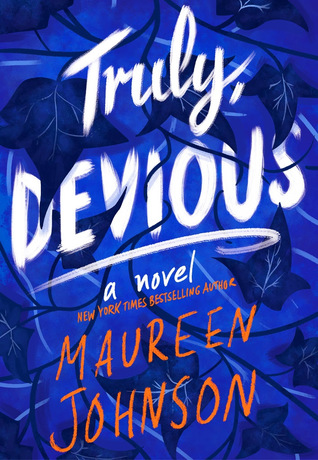
Publisher’s description:
“Ellingham Academy is a famous private school in Vermont for the brightest thinkers, inventors, and artists. It was founded by Albert Ellingham, an early twentieth century tycoon, who wanted to make a wonderful place full of riddles, twisting pathways, and gardens. “A place,” he said, “where learning is a game.”
Shortly after the school opened, his wife and daughter were kidnapped. The only real clue was a mocking riddle listing methods of murder, signed with the frightening pseudonym “Truly, Devious.” It became one of the great unsolved crimes of American history.
True-crime aficionado Stevie Bell is set to begin her first year at Ellingham Academy, and she has an ambitious plan: She will solve this cold case. That is, she will solve the case when she gets a grip on her demanding new school life and her housemates: the inventor, the novelist, the actor, the artist, and the jokester. But something strange is happening. Truly Devious makes a surprise return, and death revisits Ellingham Academy. The past has crawled out of its grave. Someone has gotten away with murder.
The two interwoven mysteries of this first book in the Truly Devious series dovetail brilliantly, and Stevie Bell will continue her relentless quest for the murderers in books two and three.”
I’ll admit that I was a bit disappointed when I first read this book, but in hindsight, I can’t entirely fault the book for that. I had gone into this book expecting a clean-cut mystery, but in reality, this book is not the story of a murder, but of a girl who wants to solve murders. In terms of structure, Truly, Devious seems to borrow from classic children’s middle grade books, following a young character flung into an unfamiliar “boarding school” environment who must uncover its secrets. With this in mind, the book is actually quite interesting as a more mature take on this subgenre.
This story is split into two narratives— Stevie’s investigations and the Ellingham murder. The Ellingham murder was certainly the most compelling part for me. It included multiple perspectives and interviews from various characters in the household, creating an almost Agatha Christie-esque mystery to follow along with. Not only does it set up a mystery which will be the center of the rest of the series, but it humanizes the victims of crime, which is too often ignored in mysteries both real and fictitious.
Stevie’s investigations, in contrast, were underwhelming. On one hand, the framing of these sections was more contemporary YA than mystery, making the book much more character-driven than most detective books are and putting Stevie’s personal life at the forefront of much of the book. On the other hand, the book sacrificed having a more complex plot and still floundered in actually creating compelling characters.
Stevie, the main character, did grow on me. She has anxiety, which manifests through rambling and almost painfully self-conscious thoughts. While I can see how some may not like this style, I thought that it was a great way for Johnson to convey Stevie’s character through the narration. However, the supporting cast was entirely forgettable. Some of them were cartoonish to the point of laughability and the interactions were often forced, and Johnson often resorted to telling the reader practically point blank if characters were friends/romantic interests/etc.
Plot-wise, I just wish that there could have been more overlap between the two storylines. I do trust that this will happen more with the 2nd and 3rd books, but it would have been nice to see them converge in this book, as it reads as two very disparate stories connected only by the setting.
Unfortunately, this first installment does not stand well on its own even after accounting for the misaligned expectations, but it does act as the set up for what promises to be a very intriguing series, which I hope will be able to fill in the gaps left behind by the first book.
The A.B.C Murders by Agatha Christie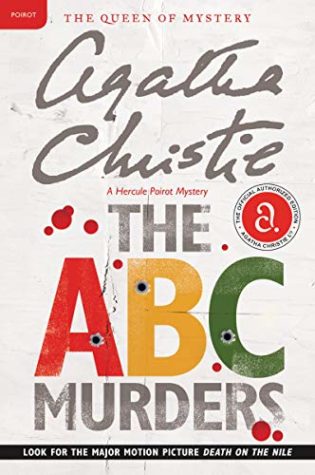
Publisher’s description:
“When Alice Asher is murdered in Andover, Hercule Poirot is already looking into the clues. Alphabetically speaking, it’s one letter down, twenty-five to go.
There’s a serial killer on the loose. His macabre calling card is to leave the ABC Railway Guide beside each victim’s body. But if A is for Alice Asher, bludgeoned to death in Andover, and B is for Betty Bernard, strangled with her belt on the beach at Bexhill, who will then be Victim C? More importantly, why is this happening?”
This book is probably best described as the platonic ideal of a mystery. If you love mystery, you will love this. If you don’t, then I guess that’s too bad for you.
Like many mysteries, this book’s main issue comes from the fact that there is quite a lot of information and not quite as much action, especially at the beginning. This is understandable, but it was often confusing and full of details which seemed nonsensical until the very end. Given the genre though, I think that this book practiced remarkable restraint in this area, breaking up the interviews and information by escalating stakes as the investigation unfolds.
Hercule Poirot is perhaps one of the most famous fictional detectives, and this is not without reason. He is competent, of course, but he is also charming and gets to know the other characters as people, so he feels less like a way for the author to tell you what you need and just a bit more like an actual character who is part of the story, rather than just an observer.
This book will probably not be too predictable for first-time readers of Agatha Christie, but it might be if you are familiar with her writing. However, I don’t think that “predictable” should be such a grave insult for mystery books. While the murderer may be guessed, Christie delivers by making it unclear as to how Hercule will solve the mystery. Whether or not you know the murderer, there is still something for you.
This book knows what it is and does not try to be anything else, and I respect it for that. It’s exciting and full of red herrings, just as any mystery should be, and is a great place to start with if you are looking to read more classic mystery novels.
Dark academia
While the other categories in this list are closely related to Halloween, Dark Academia is one that I think suits not only the month of October, but the entirety of fall. While many are familiar with this concept as an aesthetic centered around gothic buildings, tweed, and neutral colors, Dark Academia started out as a subgenre of books, pioneered by the cult classic The Secret History by Donna Tartt.
It’s hard to summarize what the genre is, but in the simplest terms, it takes place in academic settings but throws in a dark twist, often centered around themes of obsession, art, beauty, and death.
The genre is controversial, though, due to the elitism in its exploration of the “refined” and the animalistic. Despite the genre often condemning the behaviors and mindsets it portrays, some believe that it also romanticizes them. While this isn’t entirely unfounded, its romanticism isn’t just the subject of critique but also at the core of this genre’s allure, because whether it portrays the horrifying and primal or the prim and mundane, this genre finds beauty in it all.
The Secret History by Donna Tartt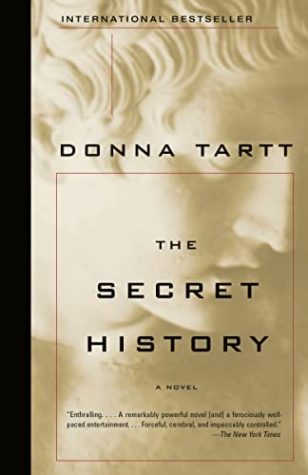
Publisher’s description:
“Under the influence of their charismatic classics professor, a group of clever, eccentric misfits at an elite New England college discover a way of thinking and living that is a world away from the humdrum existence of their contemporaries. But when they go beyond the boundaries of normal morality they slip gradually from obsession to corruption and betrayal, and at last – inexorably – into evil.”
No fall book recommendation is complete without Donna Tartt’s The Secret History. It is a book that seems to inspire extreme passion in its readers, on both ends of the spectrum. Love it or hate it, though, it has come to define an entire subgenre and has gained much notoriety.
In a way, its popularity is a stumbling block when it comes to appreciating the book. Everyone has an opinion on it, and that makes it hard to read it for enjoyment instead of reading it to try to make an opinion. I’ll admit that the first time I read it I did the same, but upon a second re-read, I am much more fond of it.
The book is beautifully written. In this area it does live up to its reputation. Written from the perspective of an outsider about a tempting but corrupt world, it may be the book for fans of The Great Gatsby, which the author even acknowledges in the book itself.
What isn’t so true about the book is the mythos that has been created around it. In reality, the book does not curate the narrow, idealized aesthetic it is associated with, but rather portrays the dingy settings and mundane-ness of the students who try so hard to be special. The students are not otherworldly, but simply ordinary people with the same boring flaws you already see in the pretentious, rich kids that you know in real life. They are taken to extremes, yes, but at their core, they are not all that strange. It’s a nuance that makes the book so much more interesting to read, and when it is lost, it often creates disappointment due to the misaligned expectations.
However, because of this, defenders of this book have the tendency to dismiss all critics as having misinterpreted the satirical aspects of it. I find that this defense, while valid in some cases, tends to be weak. Just because a book sets out to critique an idea, doesn’t mean that it doesn’t also indulge in it in ways that may not appeal to all readers, or that it adequately addresses all of the issues it brings up.
The book is also incredibly dense, and it’s not a bad thing. I find that it is a choice that makes sense, and it would not feel as complete if it were shortened. For some people, it sucks them right in. Others feel as if they need to push their way through. My advice is that, if you find yourself in the latter category, you shouldn’t force yourself to finish it. It will get slower and denser the further you read, and if you don’t find yourself enjoying that, then you should take a break from it and maybe try some other time.
Overall, readers may want to try ignoring everything they’ve heard about this book, because it is best read without having any expectations at all. I know that it isn’t the easiest advice to follow, but it is a book that will divide people massively. The good thing about it, though, is that even though there are ups and downs, the book feels consistent throughout the entirety in terms of the mood, so if you find yourself really enjoying it, then you are probably going to enjoy it, and if you don’t, then you probably won’t. Trust your gut.
I hope that you are able to find a book to put you in the fall mood! Check back in a few months for some winter book reviews.

